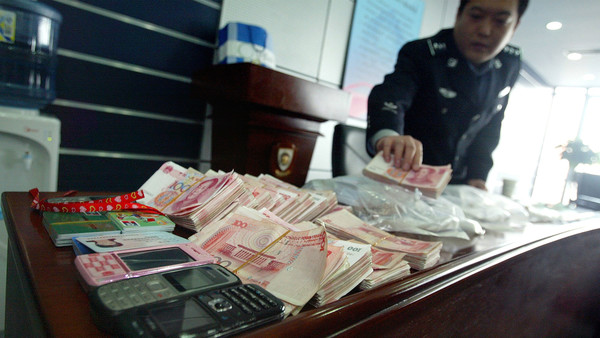November 20, 2015 9:16 am
Chinese police have arrested hundreds of people suspected of running underground banks that illegally transferred more than Rmb800bn ($125bn) out of China into foreign currencies.
News of the busts comes as Beijing has been tightening capital controls to relieve downward pressure on the value of the renminbi and stop money flooding out of the country.
The central bank has been intervening heavily in onshore and offshore foreign exchange markets to prop up the value of the Chinese currency since it carried out a small devaluation and changed the mechanism for setting its exchange rate in early August.
Police have cracked 170 cases of illegal fund transfers and money laundering involving more than Rmb800bn since April, according to the People’s Daily, the official mouthpiece of the ruling Communist party.
The newspaper said illegal flows of money out of the country have not only affected China’s foreign exchange management system but also seriously disturbed “financial and capital markets order”.
In the biggest illegal money transfer scheme yet discovered in China, about Rmb410bn was transferred overseas using hundreds of bank accounts in southern China and the territory of Hong Kong, which is outside the country’s capital controls.
The crackdown has been carried out by China’s police in co-operation with the foreign exchange regulator and the central bank, which have been tightening already strict capital controls.
The campaign against underground banks was ramped up following the August 11 devaluation and exchange rate reform as the government tried to block the flow of hundreds of billions of dollars fleeing the country and the renminbi.
The central bank was forced to spend hundreds of billions of China’s foreign exchange reserves, which are still the world’s largest at $3.5tn, in an attempt to hold up the value of the currency.
Huge outflows of cash appear to have slowed in October, with official figures showing the central bank and commercial banks bought a net $2bn of foreign exchange last month.
In the past week, Beijing has also taken steps to restrict transactions at offshore renminbi clearing banks, in an attempt to curb speculators betting on further depreciation, Reuters reported on Wednesday.
Offshore renminbi clearing banks have been instructed by the central bank to suspend trading in bond repos and renminbi account financing.
In September, the foreign exchange regulator began looking into corporate purchases of foreign currency to try to stem the flow of cash out of the country.
The series of moves to restrict currency transactions comes even as Beijing is pushing for the International Monetary Fund to include the renminbi as a component of its “Special Drawing Rights” reserve asset.
The IMF is likely to agree to include the renminbi in the SDR at the end of this month, in spite of Beijing’s recent steps to tighten capital controls, which go against the IMF’s requirement that all included currencies should be “freely usable”.
Analysts say that if the renminbi does join the dollar, euro, yen and pound as a component of the SDR, that could reduce some of the depreciation pressure on the currency — because inclusion will make it more likely that central banks will include it in their reserves.
But some experts say the significance of the renminbi being included in the SDR has been exaggerated.
“The inclusion is symbolic though it should be regarded as a good thing,” said Yu Yongding, an academic adviser to the central bank’s monetary policy committee from 2004-06, in an interview with Bloomberg. “It will not have any significant impact on anything — and it will change nothing unless the inclusion is a step toward more reforms of the international monetary system.”

No comments:
Post a Comment
Comments always welcome!